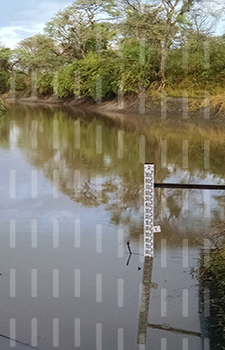Effective water governance means that everyone responsible for water policy, production, sustainability, security, and service delivery has the tools, resources, and capacity to best manage water and wastewater resources. Across the globe, governments, water utilities, and facilities or sectors dependent on water—such as hydropower facilities—have a strong stake in optimizing their water resources management. This optimization is even more imperative in the face of rapidly shifting demand from urbanization and population growth and increasing uncertainty from erratic weather patterns and droughts. RTI International has projects all over the world, and we know that a key requirement for successfully managing our water resources is to ensure a strong evidence base for water management and water governance decision-making.
Evidence is based on data, which need to come from a variety of sources and can be collected through a wide range of approaches. Data are essential for decision-making to achieve the most efficient, equitable, and sustainable use of water. However, the value of investing in data collection may be limited if it’s not supported by complementary investments in systems for summarizing, interpreting, disseminating, and acting on the information it contains. In some instances, an overabundance of data can even hamper decision-making, particularly if there’s a lack of expertise in converting the data into actionable knowledge.
In this webinar, you will learn about approaches for assessing and optimizing the value of data for water governance. How can the value of information and the return on data-related investments be measured? What are the main barriers that must be overcome to translate data into positive impacts for society? How have these approaches been applied and these barriers successfully addressed in existing water management examples? Register today using the form above to learn more.
Key learning objectives:
During this webinar, you'll learn:
-
1. How evidence is driving improved water governance of resources and WASH service delivery on the ground and in policy reform
-
2. How to understand and assess the value of data and information resources in the context of water governance and how to adapt when there’s a lack of high-quality data available
-
3. The kinds of evidence needed for water governance and how to make it accessible and useful to stakeholders and decision-makers using current project examples from Nigeria, the Philippines, and more
Our Presenters:
Barbara Rossmiller
Project Director, USAID Effective Water, Sanitation, and Hygiene Services (E-WASH) Program, Nigeria
Director of Programs, Climate, Natural Resources, and Water
Learning, Energy & Environment for Development (LEED)
RTI International Development Group
Dennis Mwanza
Chief of Party, USAID Effective Water, Sanitation, and Hygiene Services (E-WASH) Program, Nigeria
Learning, Energy & Environment for Development (LEED)
RTI International Development Group
George L. Van Houtven, PhD
Director, Ecosystem Services Research
RTI Center for Water Resources
Katie van Werkhoven, PhD
Senior Water Resources Engineer
RTI Center for Water Resources
Learn More
Learn more about RTI's water-related work, including water management and governance, sustainable use of water resources, ensuring safe drinking water, anticipating future water issues and needs, and more.

